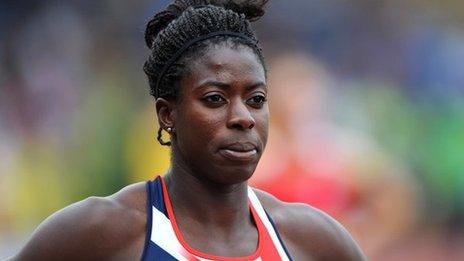Peter Elliott eyes return to Olympic middle-distance glory days
- Published
Elliott recalls battle with Coe
Peter Elliott has challenged Great Britain's male middle-distance runners to end the 24-year wait for a global championship medal at London 2012.
Elliott was the last British man to win a major 800m or 1500m medal, taking 1500m silver at the 1988 Olympics.
"At a major championships, the hardest thing is getting to a final," Elliott told BBC Sport. "Once you are in the final anything can happen.
"If we can get that medal hopefully it can bring the next generation through."
Elliott, who combined athletics training with working full-time at a steel plant, was part of a golden generation of British middle-distance runners in the 1980s, when Sebastian Coe, Steve Ovett and Steve Cram were also winning major medals on a regular basis.
Coe claimed 1500m gold at the 1980 and 1984 Olympics, Ovett won the 800m in 1980 and Cram took 1500m silver in 1984 and gold at the 1983 World Championships.
Since then, while Kelly Holmes, Jenny Meadows, Hannah England and Lisa Dobriskey have put British female middle-distance running on the map with medals at major events, the fortunes of Britain's men have nose-dived.
Athletes such as Tom McKean, John Mayock, Michael East and Andy Baddeley have reached global championship finals, but none of them have managed a top-three finish.
Indeed, East's triumph at the 2002 Commonwealth Games in Manchester was the first British middle-distance gold since Elliott's success at the same championship in 1990.
"When Michael East won gold, I thought this is the start of a new era," said Elliott. "Unfortunately that didn't quite come through.
"We have some young talent and hopefully they can produce the goods if not in 2012 then hopefully in 2016."
Baddeley, 29, who finished ninth in the 1500m final in the Beijing 2008 Olympics, is leading the British middle-distance challenge once again after running the 1500m qualifying time in April, but Elliott is also backing younger talents like Andrew Osagie (24), Michael Rimmer (26) and James Shane (22) to compete for glory at London 2012.
Osagie took 800m bronze at the World Indoors in March, Rimmer won silver over the same distance at the 2010 Europeans and Shane has continued to improve since winning the 1500m at the 2011 UK trials.
"I'm sure someone will come through and win a surprise medal and I would like to think somebody from 800 or 1500 in the mens would achieve that," he said.
"It just needs someone like Osagie or Baddeley to run the right race, the perfect race on the day."
Elliott says the difficulties experienced by his successors are partly explained by the standard of competition, which has increased due to athletes from middle-distance powerhouses like Kenya switching nationalities to compete in major championships.
"It's very different now because when I stood on Olympic start line I would be up against maybe three Kenyans and two Moroccans.
"But now all British athletes in an Olympic Games could be up against seven Kenyans, three running for Kenya and the others running for Doha, Denmark and places like that. That has made a difference between getting into the final or not.
"But they still have to run the times. I ran 1 minute, 42.9 secs [over 800m] way back in 1990 and nobody has come close to that since. And it's not as if the support isn't there."
Elliott is part of that support network for British athletes through his current role as a regional director for the English Institute of Sport, which provides sport science and sport medicine services to Olympic competitors at purpose-built facilities around the country.
"We leave no stone unturned in the pursuit of excellence," he said. "We provide a multi-disciplinary approach around an athlete, we have the expertise in physiotherapy, strength and conditioning, psychology and nutrition.
"Physically and mentally, Team GB will be going to the start line in London as best prepared as they can possibly be."
- Published9 May 2012

- Published10 September 2015
